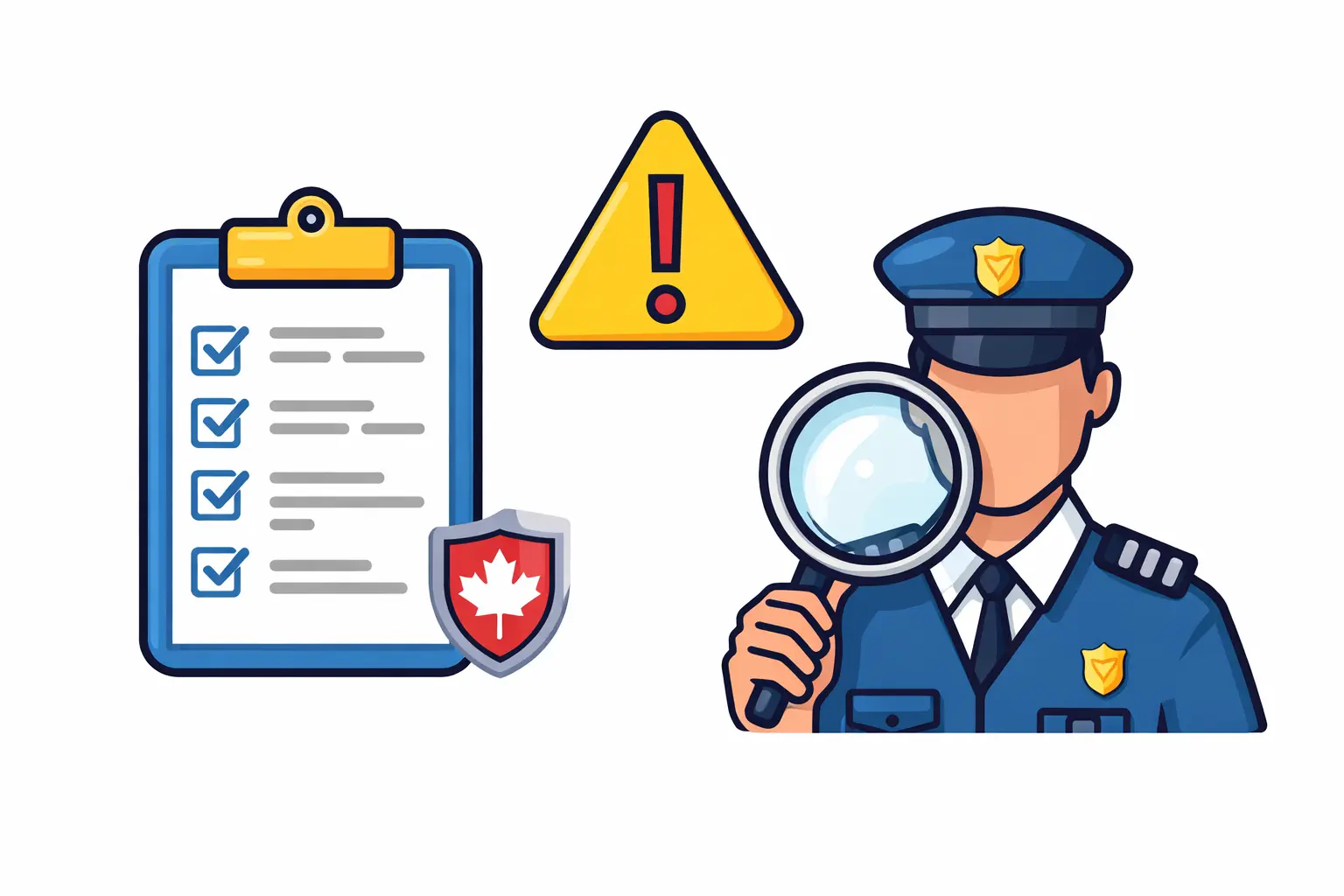Planning to Return to Canada After a Removal Order?
An Authorization to Return to Canada (ARC) may be required depending on the type of removal order issued and your compliance history. Approval is discretionary and assessed on several legal factors.
Each case is unique. A proper evaluation should be completed before proceeding to reduce the risk of refusal and unnecessary costs.

What Is an Authorization to Return to Canada (ARC)?
ARC is special permission that allows you to apply to return to Canada after being removed.
ARC needs to be submitted together with your other applications. Only once the Canadian immigration officers approve your ARC application, they can review your visa, work permit, or study permit application instead of refusing it because of your past removal.
Legal Basis of ARC – IRPA Section 52
Authorization to Return to Canada (ARC) is rooted in Section 52 of the Immigration and Refugee Protection Act (IRPA), which governs removal orders and the legal consequences of being removed from Canada.
Under IRPA, individuals who are subject to certain removal orders may require formal authorization before returning. ARC decisions are discretionary and assessed in light of the applicant’s removal history, compliance record, and current purpose of travel.
Quick Check: Do You Need an ARC?
Deportation Order
You always need an Authorization to Return to Canada (ARC).
Exclusion Order
You need an ARC if you return to Canada within 12 months or if you did not properly confirm your departure.
Departure Order
You do not need ARC if you left Canada within 30 days and confirmed your departure with CBSA.
Who Actually Needs an Authorization to Return to Canada (ARC)?
Whether you need an ARC depends on the type of removal order you received and whether you followed the departure rules.
Type of Removal Order | Is ARC Required? | What Officers Look For |
|---|---|---|
Deportation Order | Always required | Reason for removal, time passed, compliance after removal |
Exclusion Order | Sometimes | Proof of departure, time elapsed, purpose of return |
Departure Order | Only if not complied | Departure within 30 days + CBSA verification |
Do not assume ARC is required simply because a visa was refused. Applying unnecessarily can delay your case.
📢 Video Overview
This video explains the basic ARC framework and common removal orders.
Immigration officers review each ARC case individually and consider factors such as risk, credibility, and your future compliance with immigration rules.
A proper case assessment helps you prepare a stronger ARC application before submission.

How Immigration Officers Assess ARC Applications
Immigration officers make ARC decisions case by case.
Officers assess risk, credibility, and future compliance — not just documents.
Officers typically review:
Reason for the original removal
Compliance with the removal order
Time passed since removal
Previous refusals or enforcement actions
Purpose of return
Likelihood of future compliance
Overall credibility
For additional info on requirements, visit the IRCC inadmissibility information.
⚠️ Submitting an ARC request without addressing officer concerns often results in refusal.
ARC and Other Applications: How They Work Together
Applicants rarely submit ARC on its own. In most cases, immigration officers review ARC together with another application.
Immigration officers usually assess ARC alongside a visitor visa, work permit, or study permit application.
Officers also evaluate whether approving ARC makes sense based on your travel purpose and your overall immigration history.
ARC + Visitor Visa (TRV)
This is the most common ARC scenario.
Immigration officers look at more than just your ARC request. They also check whether your visitor visa application is strong and believable.
A weak TRV application can lead to refusal of both the visa and the ARC request.
ARC + Work Permit or Study Permit
When you apply for ARC together with a work permit or study permit, immigration officers carefully review whether your plan in Canada makes sense and whether you are likely to follow all permit conditions.
If you previously broke immigration rules, officers will review your case more closely.
ARC + Permanent Residence Applications
ARC may be required when a permanent residence application is submitted after a prior removal order.
In these situations, officers look at whether you still pose any long-term risk, whether they can trust your application, and whether you have fixed the problems that caused your removal.
ARC After PR Card or H&C-Related Cases
In some situations, ARC issues overlap with PR card renewal refusals or humanitarian and compassionate (H&C) considerations.
These cases require careful sequencing to avoid triggering unnecessary enforcement or additional refusals.
⚠️ A refusal of the accompanying visa or permit application often results in refusal of the ARC request as well.
You should always assess ARC as part of your overall immigration strategy.
ARC Case Examples (Client Details Removed)
The outcome of an ARC request depends heavily on facts, timing, and strategy.
Case Example 1: ARC Approved After Long-Past Removal
Hassan, a Jordanian citizen, was removed from Canada more than 20 years ago when he was still a minor. Years later, he applied for a Canadian study permit, but immigration refused his application because of the old removal record.
We prepared an ARC request explaining the circumstances of the removal and Hassan’s long history of lawful travel since then. After reviewing the case, immigration officers approved the ARC and allowed the study permit application to proceed.
ARC Case Example 2: Refused Due to Weak Strategy
Santiago, a Mexican citizen, was removed from Canada in the past and later applied for ARC together with a work permit. He submitted a basic explanation letter that did not properly address the reason for his removal or show how his situation had changed.
Immigration officers refused both the ARC request and the work permit application. After receiving professional guidance and restructuring his case strategy, Santiago prepared a stronger ARC submission that clearly addressed past issues and compliance concerns, improving his chances for a successful reapplication.
ARC Case Example 3: New Passport Did Not Remove ARC Requirement
Anil was removed from Canada many years ago when he was an Indian citizen. Later, he became a UK citizen and believed that his new passport would remove the need for ARC.
He applied for an eTA using his British passport and received approval. However, when he arrived at the airport, the airline refused to let him board after identifying his previous Canadian removal record.
Anil later learned that changing citizenship does not erase a past removal order. After working with our team and submitting a properly prepared ARC application explaining his history and current travel purpose, immigration officers approved his ARC and allowed him to travel to Canada.
Why ARC Applications Get Refused (and Common Strategic Mistakes)
ARC approval is discretionary. Officers review your full immigration history, the reasons for your removal, and the credibility of your current purpose of return. Most refusals are not random — they result from identifiable legal concerns or strategic errors in how the application was prepared.
Legal Risk Factors Considered by Officers
Certain factors frequently contribute to ARC refusals:
1. Outstanding Removal Costs
If the Canada Border Services Agency (CBSA) paid for your removal (like flight ticket back to your country) and those costs remain unpaid, an ARC application is unlikely to succeed until the debt is resolved.
2. Weak or Inconsistent Explanation
Officers expect a clear and credible explanation addressing:
The reasons for the previous removal
Steps taken since leaving Canada
Why returning now is justified
A vague or emotional explanation without supporting documentation can significantly weaken the application.
3. Repeated Non-Compliance
Multiple immigration violations, overstays, or failure to respect prior conditions may raise concerns about future compliance.
4. Criminal Inadmissibility Overlap
If criminal inadmissibility is also involved, an ARC alone may not be sufficient. In some cases, Criminal Rehabilitation or additional remedies must be addressed first.
Common Strategic Mistakes Made by Applicants
In many cases, the refusal stems not from inadmissibility itself — but from weak strategy.
Common mistakes include:
Applying for ARC when it is not actually required
Submitting a generic explanation letter without addressing the officer’s concerns
Failing to clearly explain the original reason for removal
Applying too soon without demonstrating meaningful change
Combining ARC with a weak TRV or permit strategy
Ignoring prior refusals or enforcement history
Why Strategy Matters
Each refusal becomes part of your immigration record and may complicate future applications. Because ARC decisions are discretionary, the strength of your explanation, timing, and supporting evidence often determine the outcome.
ARC applications require structured legal positioning — not trial and error.
If you are unsure whether your case presents any of these risk factors, a professional assessment should be completed before proceeding.
ARC Processing Time and What to Expect
Because ARC timelines vary significantly depending on enforcement history and visa office workload, we have published a detailed breakdown of Authorization to Return to Canada processing time ranges in a separate guide.
In practice, most ARC decisions fall within a broad range.
Typical ARC Processing Time
While timelines vary, many ARC applications are decided within approximately 6 to 12 months when submitted together with a visa or permit application.
However:
Straightforward cases with strong documentation may be resolved sooner.
More complex cases may take longer than 12 months.
Cases involving criminal inadmissibility or repeated non-compliance typically require additional review.
Applications processed at high-volume visa offices may experience extended timelines.
ARC requests are usually assessed together with the accompanying TRV, work permit, or study permit application.
⚠️ You cannot travel to Canada until the ARC is formally approved, even if other parts of your application appear strong.
Because ARC approval is discretionary, realistic expectations and proper file preparation are essential.
Government Fees for ARC Applications
The government processing fee for an Authorization to Return to Canada (ARC) is currently CAD $492.50 according to IRCC fee list.
This fee is paid to Immigration, Refugees and Citizenship Canada (IRCC) and applies specifically to the ARC request itself.
However, ARC is typically submitted together with another application, such as:
Temporary Resident Visa (TRV)
Work Permit
Study Permit
Permanent Residence-related application
Additional government fees will apply depending on the type of accompanying application.
Important Considerations
The ARC fee is non-refundable, even if the application is refused.
If removal costs were paid by the Canadian government, those costs must usually be repaid before ARC approval.
Strategic Note
Because ARC decisions are discretionary and the government fee is non-refundable, many applicants choose to obtain a structured assessment before proceeding.
ARC FAQ – Authorization to Return to Canada
Do I always need ARC after a removal order?
What is the government fee for ARC?
How long does ARC processing take?
Is there a specific ARC application form (IMM 1363)?
Is there a sample ARC explanation letter I can use?
What is the ARC success rate?
Can I apply for ARC together with a TRV, study permit, or work permit?
Can I travel to Canada while ARC is in process?
Do I need to repay removal expenses before ARC approval?
Does ARC erase my previous immigration record?
Can ARC be refused more than once?
What happens if I apply for ARC when it is not required?
Can I apply for ARC if criminal inadmissibility also exists?
Need a Professional Review?
Book a free initial consultation to check if you need ARC and move forward with a clear plan.

